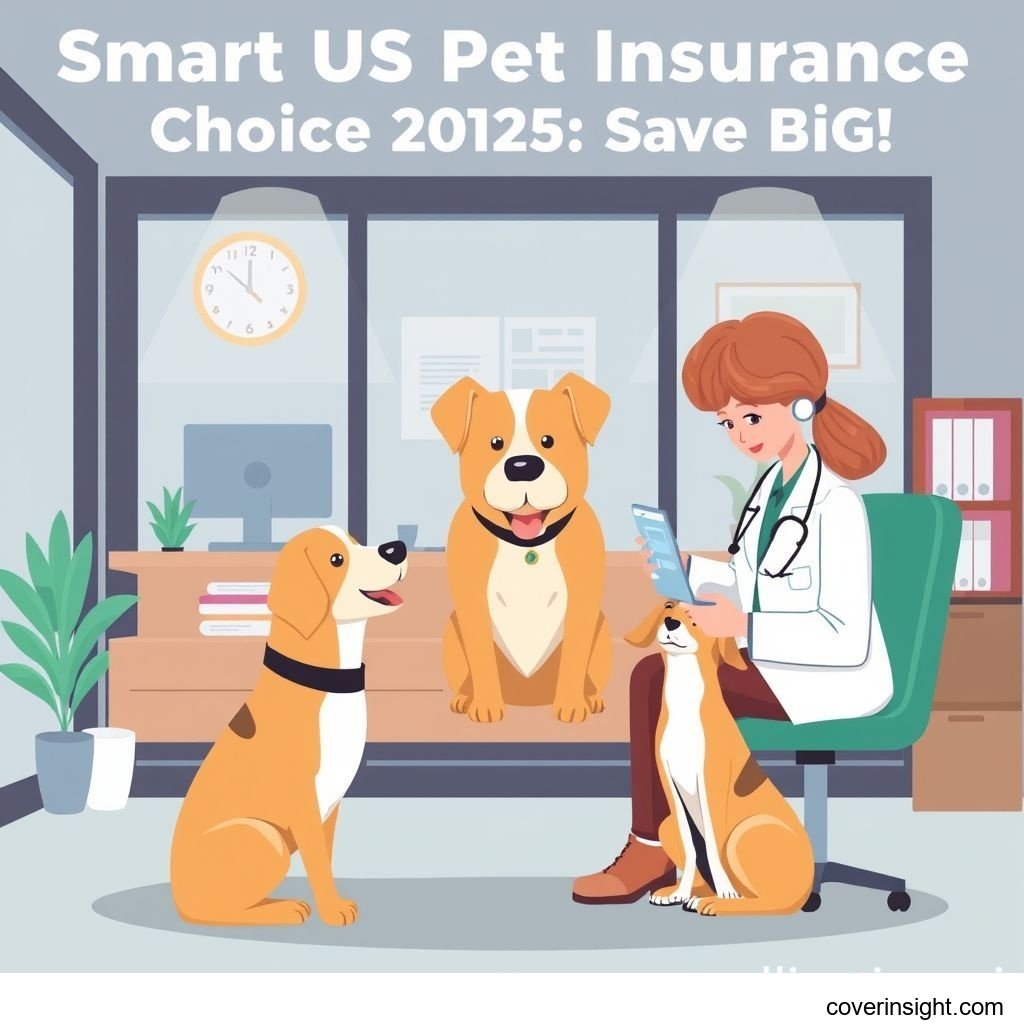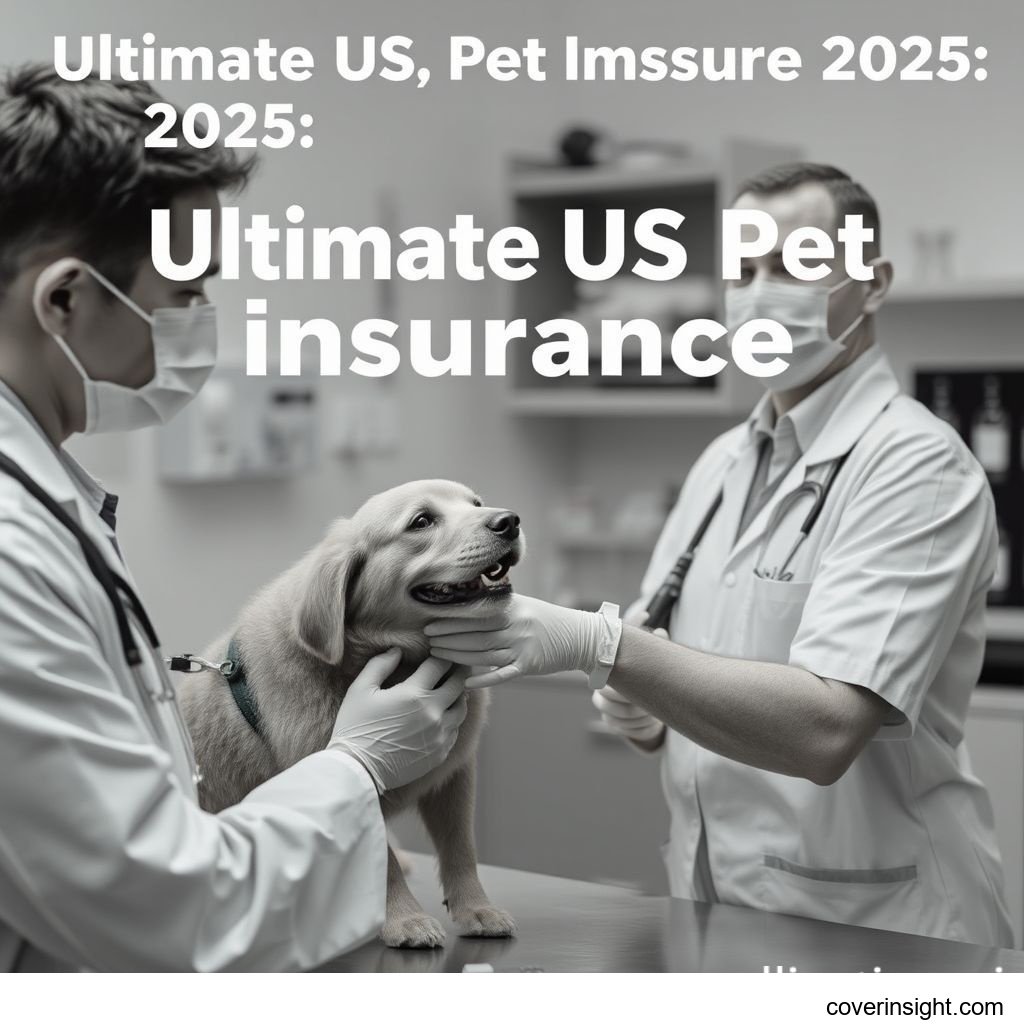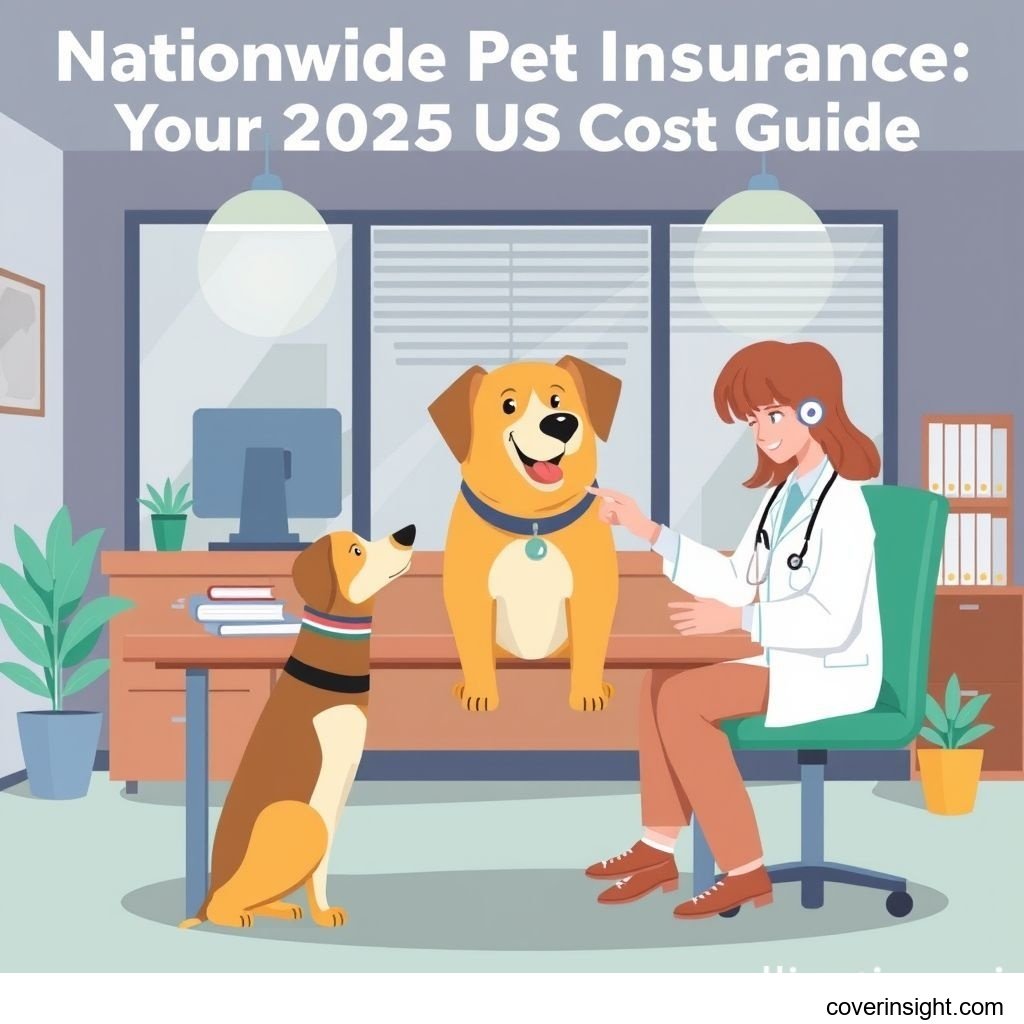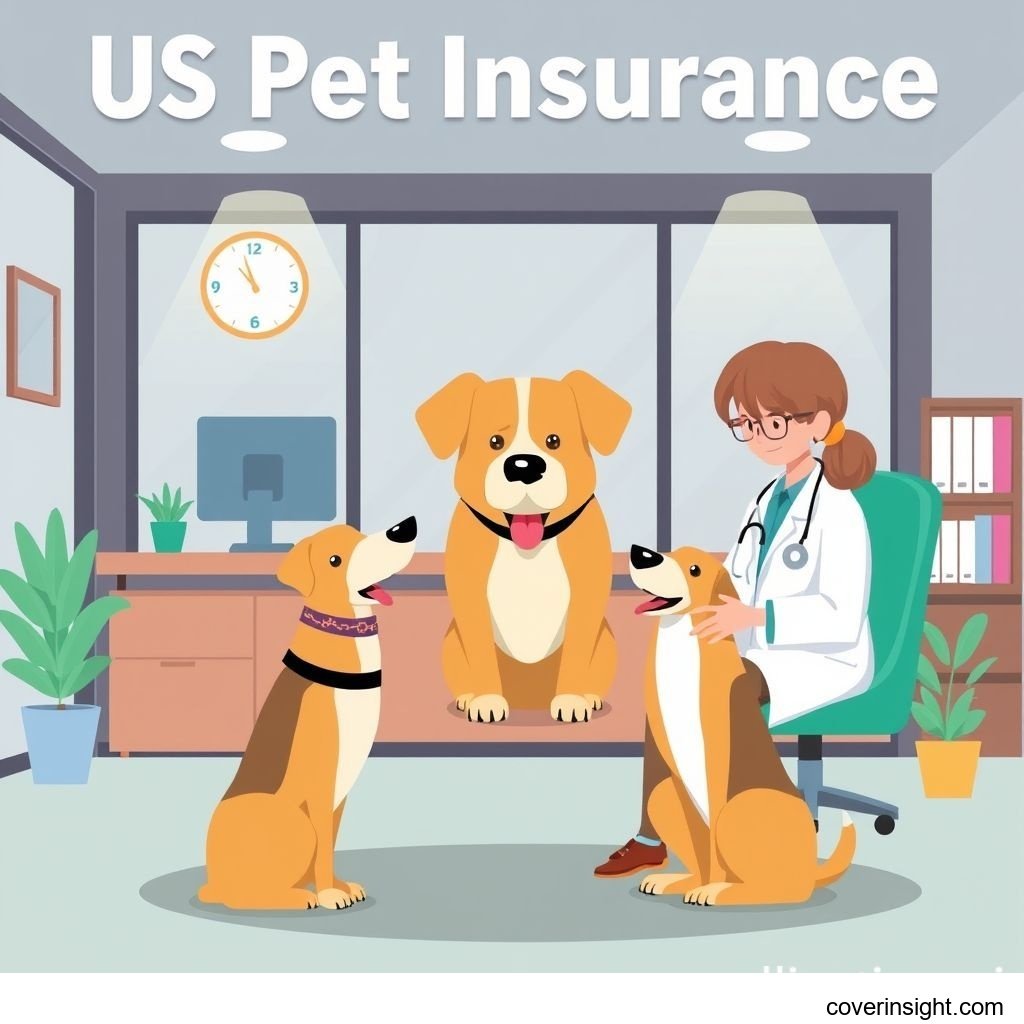Introduction
As 2025 approaches, the landscape of pet care in the US continues to evolve, making smart financial planning for your furry family members more critical than ever. The cost of visiting a veterinarian near me has steadily risen, reflecting advancements in veterinary medicine and the increasing demand for high-quality animal healthcare. While these services offer unparalleled care for our beloved pets, they can also lead to unexpected and substantial expenses. That's where pet insurance comes in – a vital tool for managing costs and ensuring your pet receives the best possible treatment without breaking the bank. Understanding your options for pet insurance in 2025 can help you save big and provide peace of mind, knowing that expert care from a qualified veterinarian near me is always within reach.
Coverage Details
Understanding what pet insurance covers—and what it doesn't—is crucial for making an informed decision. Policies vary significantly, so a careful review of the fine print is essential before committing.
What’s Included
Most comprehensive pet insurance plans are designed to cover a wide range of medical expenses arising from unexpected accidents and illnesses. This typically includes:
-
Accidents: Injuries such as broken bones, swallowed objects, snake bites, or car accidents. These can often necessitate urgent care from a veterinarian near me.
-
Illnesses: Conditions ranging from minor infections (ear, skin, urinary tract) to more serious diseases like cancer, diabetes, arthritis, and allergies.
-
Emergency Care: Visits to an emergency veterinarian near me or animal hospital for critical situations.
-
Diagnostic Tests: X-rays, MRIs, CT scans, blood tests, and lab work required to diagnose a condition.
-
Surgeries: Costs associated with surgical procedures, including anesthesia and post-operative care.
-
Prescription Medications: Drugs prescribed by your veterinarian for covered conditions.
-
Specialist Care: Referrals to veterinary specialists (e.g., cardiologists, oncologists, dermatologists).
-
Hospitalization: Overnight stays at the veterinary clinic for monitoring and treatment.
-
Alternative Therapies: Some plans may include acupuncture, chiropractic care, or hydrotherapy if prescribed.
Many plans also offer optional "wellness" riders that cover routine care like annual check-ups, vaccinations, and parasite prevention.
Common Exclusions
While pet insurance offers extensive coverage, it's equally important to be aware of what is typically excluded from policies. These common exclusions help insurers manage risk and keep premiums affordable:
-
Pre-existing Conditions: Any illness or injury that occurred or showed symptoms before the policy's effective date or during a waiting period. This is the most common exclusion.
-
Cosmetic Procedures: Elective surgeries such as declawing (unless medically necessary) or ear cropping.
-
Breeding and Whelping: Costs related to pregnancy, breeding, or giving birth.
-
Grooming: Routine grooming services like nail trims or baths.
-
Experimental Treatments: Therapies or medications that are not yet widely accepted in veterinary medicine.
-
Dietary and Prescription Foods: Unless specifically prescribed for a covered condition and sometimes limited.
-
Behavioral Training: Issues like aggression or anxiety that require specialized training, though some plans might cover behavioral medication if prescribed.
-
Deductibles and Co-pays: These are costs you are responsible for out-of-pocket, not true exclusions, but important to note as they affect your final cost.
Always read your policy document carefully to understand the specific exclusions for your chosen plan.
Navigating Costs for Your Veterinarian Near Me
The cost of pet insurance is a significant factor for many owners. Several variables influence premiums, and understanding these can help you find a plan that fits your budget without compromising on quality care from your local veterinarian near me.
Price Factors
Pet insurance premiums are not one-size-fits-all. Several key elements contribute to how much you'll pay:
-
Pet's Age: Older pets generally cost more to insure due to their increased likelihood of developing age-related conditions. Puppies and kittens are usually cheaper, but their premiums rise with age.
-
Breed: Certain breeds are predisposed to specific genetic conditions (e.g., hip dysplasia in large breeds, breathing issues in brachycephalic breeds like pugs and bulldogs). Insurers factor these risks into premiums.
-
Location: Veterinary costs vary by region, and this is reflected in insurance premiums. Urban areas with higher living costs often have higher vet fees and, consequently, higher insurance costs. Finding a veterinarian near me in a metropolitan area might mean higher premiums.
-
Type of Plan: Comprehensive plans covering accidents, illnesses, and wellness are more expensive than accident-only policies.
-
Deductible: This is the amount you must pay out-of-pocket before your insurance coverage kicks in. Higher deductibles result in lower monthly premiums, but you pay more upfront when a claim arises.
-
Reimbursement Level: This is the percentage of eligible vet bills that the insurer will pay back to you after your deductible is met (e.g., 70%, 80%, 90%). A higher reimbursement level means higher premiums.
-
Annual Limit: Some policies have a maximum amount they will pay out in a year. Plans with higher annual limits typically have higher premiums.
Saving Tips
Even with varying price factors, there are several strategies you can employ to reduce the cost of your pet insurance:
-
Start Early: Insuring your pet when they are young and healthy will secure lower premiums and minimize the chances of pre-existing conditions being excluded later. This is particularly relevant when considering the best pet insurance for puppies.
-
Choose a Higher Deductible: If you're comfortable paying more out-of-pocket for unexpected events, opting for a higher deductible can significantly lower your monthly premium.
-
Select a Lower Reimbursement Rate: While a 90% reimbursement rate sounds appealing, an 80% or 70% rate will reduce your premium, and you'll still be covered for the majority of the cost.
-
Look for Discounts: Many providers offer discounts for:
-
Multiple pets: Insuring more than one pet with the same company.
-
Annual payments: Paying your premium once a year instead of monthly.
-
Employer benefits: Some companies offer pet insurance as an employee benefit.
-
Veterinarian recommendations: Occasionally, vets partner with specific insurers for discounts.
-
-
Consider an Accident-Only Plan: If your budget is tight, an accident-only policy is cheaper and provides essential coverage for emergencies that often result in the highest bills from a veterinarian near me.
-
Compare Quotes: Use online comparison tools to get quotes from multiple providers. Prices for similar coverage can vary widely.
-
Review Wellness Riders: Decide if a wellness plan is truly cost-effective for your pet's needs. Sometimes, budgeting for routine care yourself can be cheaper than adding a wellness rider.
Selecting a Plan for Your Veterinarian Near Me Visits
Choosing the right pet insurance plan involves more than just comparing costs. It's about finding a provider that aligns with your pet's needs, your financial comfort, and the expected care from your preferred veterinarian near me.
Key Considerations
When evaluating pet insurance options, keep the following in mind:
-
Provider Reputation and Financial Stability: Research the insurer's history, customer reviews, and financial strength. A reliable company will process claims efficiently and fairly.
-
Customization Options: Can you adjust the deductible, reimbursement level, and annual limit to create a plan that fits your budget and risk tolerance?
-
Waiting Periods: Understand the waiting periods for accidents and illnesses. Some plans have shorter waits than others.
-
Customer Service: Is their claims process straightforward? Do they offer 24/7 support?
-
Direct Payments to Vets: While less common, some insurers can pay the veterinarian near me directly, reducing your upfront out-of-pocket costs at the time of service.
-
Network Restrictions: Most pet insurance plans allow you to visit any licensed veterinarian near me, but confirm there are no network limitations that might restrict your choice of care.
Best Pet Insurance for Puppies
Puppies, while adorable, are prone to a unique set of challenges that make pet insurance an especially wise investment from an early age. The best pet insurance for puppies typically offers comprehensive coverage for common puppy ailments and accidents.
Here’s why it's crucial for puppies:
-
Accidents: Puppies are curious and energetic, often getting into mischief that can lead to accidents like falls, ingesting foreign objects, or minor injuries during play.
-
Common Puppy Illnesses: Puppies are susceptible to various conditions such as kennel cough, parvovirus, giardia, and ear infections, especially before their full vaccination series.
-
Hereditary Conditions: While not always evident immediately, some breeds are predisposed to hereditary conditions that may manifest early in life. Insuring early helps avoid these being classified as pre-existing.
-
Wellness Benefits: Many of the best pet insurance for puppies plans offer optional wellness add-ons that cover routine vaccinations, deworming, and spaying/neutering—procedures critical in a puppy's first year.
-
Lower Premiums: Insuring a young, healthy puppy means you lock in lower premiums that will typically increase more gradually over time compared to insuring an older dog.
When selecting a plan for your puppy, look for short waiting periods, especially for accidents, and consider a wellness add-on to cover their initial preventative care needs.
Dental Care and Preventative Measures
While often overlooked, dental health is a cornerstone of your pet's overall well-being. Serious dental issues can lead to pain, infection, and even impact vital organs. This makes considering dental care pet insurance an important part of a comprehensive pet health strategy.
Dental Care Pet Insurance Explained
Traditional pet insurance policies often treat dental illnesses and injuries similarly to other medical conditions, meaning they cover things like:
-
Accidental Tooth Fractures: If your pet breaks a tooth from chewing on something hard.
-
Periodontal Disease: When this progresses to an advanced stage requiring extractions or root canals due to infection.
-
Stomatitis: Inflammation of the mouth.
However, standard policies rarely cover routine dental cleanings or preventative care unless you purchase a specific dental care pet insurance rider or a comprehensive wellness plan. These riders are designed to offset the cost of:
-
Annual Dental Cleanings: Including scaling and polishing.
-
Dental X-rays: Taken during routine check-ups.
-
Fluoride Treatments: To strengthen enamel.
When evaluating policies, ask specific questions about:
-
What type of dental coverage is included? Is it only for emergencies or illnesses, or does it cover preventative care?
-
Is there a separate deductible for dental?
-
Are there annual limits for dental procedures?
-
Does it cover pre-existing dental conditions? (Unlikely, but worth asking)
For many pets, especially as they age, routine dental care becomes essential, and the costs can add up quickly without dedicated dental care pet insurance.
Beyond Just Insurance
While pet insurance, including potential dental care pet insurance riders, provides a financial safety net, proactive measures are key to your pet's health and can reduce the frequency of costly vet visits to a veterinarian near me.
Here are crucial preventative measures:
-
Regular Veterinary Check-ups: Annual or bi-annual visits to your veterinarian near me for full physical examinations, vaccinations, and parasite prevention. Early detection of issues is vital.
-
Balanced Nutrition: A high-quality, species-appropriate diet supports overall health, weight management, and can prevent many common ailments.
-
Consistent Exercise: Adequate physical activity maintains a healthy weight, strengthens muscles, and boosts mental well-being.
-
Home Dental Care: Brushing your pet's teeth regularly, using dental chews, and specialized dental diets can significantly reduce plaque and tartar buildup, potentially minimizing the need for professional cleanings.
-
Preventative Medications: Staying up-to-date on flea, tick, and heartworm prevention as recommended by your veterinarian near me.
-
Safe Environment: Pet-proofing your home and supervising outdoor play can prevent accidents and ingestion of harmful substances.
Investing in preventative care not only keeps your pet healthier but can also save you money on expensive emergency treatments in the long run.
FAQs
Finding a veterinarian near me that you trust is important, and so is understanding how pet insurance can help manage related costs. Here are common questions answered:
-
How much does veterinarian near me cost?
The cost of visiting a veterinarian near me varies significantly based on location, the type of service, and the pet's condition. A routine check-up might range from $50-$250, while emergency visits or surgeries can quickly escalate into hundreds or thousands of dollars. Pet insurance helps mitigate these unpredictable costs.
-
What affects pet insurance premiums?
Premiums are primarily influenced by your pet's age, breed, your geographical location (where your veterinarian near me is located), the type of coverage chosen (accident-only vs. comprehensive), and your selected deductible, reimbursement level, and annual limit.
-
Is pet insurance mandatory in the US?
No, pet insurance is not mandatory in the US. It is an optional financial product that pet owners choose to purchase to help cover unexpected veterinary expenses.
-
How do I choose the best pet insurance for my needs?
To choose the best plan, compare quotes from multiple reputable providers. Consider your pet's age, breed, and health status. Look for a plan with customizable options for deductible, reimbursement, and annual limits that fit your budget and risk tolerance. Read reviews and understand the claims process.
-
What are the consequences of not having pet insurance coverage?
Without pet insurance, you are solely responsible for 100% of your pet's veterinary bills. This can lead to significant financial strain during emergencies or chronic illnesses, potentially forcing difficult decisions about your pet's care based on affordability rather than medical necessity.
Ensuring Access to a Trusted Veterinarian Near Me
In conclusion, securing smart pet insurance choices for 2025 is not just about saving money; it's about investing in your pet's health and your peace of mind. With the rising costs of veterinary care, a well-chosen policy ensures that regardless of what unexpected health challenges your pet faces, you'll have the financial support to provide the best possible treatment from a qualified veterinarian near me.
From understanding comprehensive coverage for accidents and illnesses, to exploring specific options like the best pet insurance for puppies and dedicated dental care pet insurance, every detail counts. Remember to compare quotes thoroughly, understand the fine print, and consider the long-term benefits of a policy that grows with your pet. By planning ahead, you empower yourself to make health decisions based on what’s best for your beloved companion, ensuring they live a long, happy, and healthy life with consistent access to excellent care from any veterinarian near me. Start exploring your options today to secure your pet's future well-being.
Find comprehensive insurance resources globally here. Visit our US Insurance Home for more information. Learn more about insurance regulations from the National Association of Insurance Commissioners. Explore consumer health insurance information on Healthcare.gov. Locate your specific State Insurance Department for local regulations.









Comments